磨难与救赎 --论《魔桶》
人物性格在碰撞中凸现:读马拉墨德的短篇小说《魔桶》
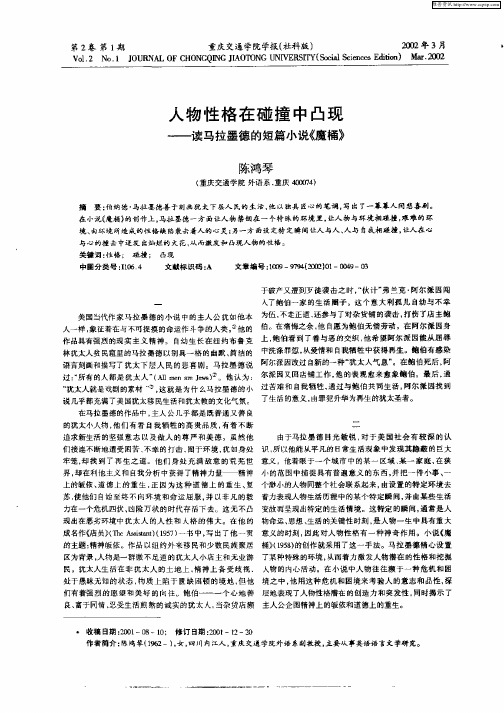
们 接连不断地 遭受困苦 、 不幸 的打击 , 囿于环境 . 如 身处 识 , 以他能从平凡的 日常生活现 象 中发现 其隐蔽 的 巨大 犹 所
某 在狭 牢笼 , 找 到 了再 生 之道 。他 们 身处 充 满敌 意 的 荒 芜世 意义 。他着 眼于一 个城 市 中的某一 区域 、 一 家庭 , 却 界 , 在利他 主义和 自我分 析 中获得 了精 神力量——精 神 小 的范 围中捕 捉具 有普遍 意义 的东 西 , 却 并把 一件 小事 、 一
上的皈依 、 德 上 的重 生 . 因 为 这 种道 德 上 的重 生 、 道 正 复 个渺小 的人 物同整个社 会联 系起来 , 由设置 的特定环 境去 苏, 使他们 自始 至终 不 向环境 和命 运 屈服 , 以非凡 的 毅 着力表 现人 物生活历程 中 的某 个特定瞬 间 , 由某些 生 活 并 并 通 力在 一个危机 四伏 、 险万状 的时代存 活下 去。这无不 凸 变故而呈现出特定 的生活情 境。这特定 的瞬 间, 常是人 凶 现出在恶劣 环境 中犹 太人 的人 性和 人格 的 伟大 。在 他 的 物命运 、 思想 、 生活 的关 键性 时刻 , 是人物一 生 中具有重 大 成名作《 店员》 T eA ̄ t t(9 7 一书 中 , 出了他 一 贯 意义的时刻 , 此对人 物性 格有 一种神 奇作 用 。小 说 《 ( h s s n) 15 ) a 写 因 魔 的主题 : 精神皈依 。作 品 以纽约 外来移 民和少 数 民族 聚居 桶》 15 ) (9 8 的创作 就采 用了这 一手 法。马 拉 墨德精 心设 置
区为背景 , 人物是一群微 不足道 的犹太 人小 店主和无业 游 了某种特殊 的环境 , 从而 着力激 发人物潜在 的性 格和挖 掘 民 。犹 太人 生 活在非 犹 太人 的土 地上 , 神上 备 受歧视 , 人物的内心活动 。在小说 中人 物往 往濒 于一 种危 机和 困 精
魔桶
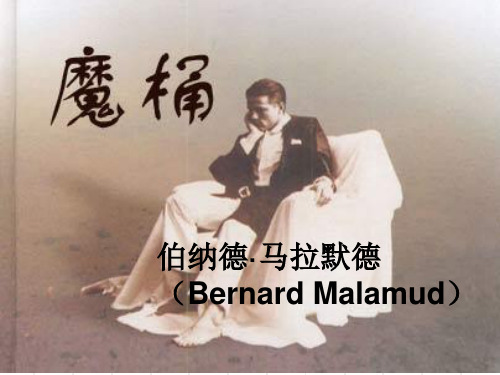
作者是怎样塑造斯妲拉这一人物形象 的?这对列奥的性格塑造有什么帮助?
小说中,除了沙兹曼的片言只语之外,对斯妲拉 小说中的斯妲拉其实是列奥心中的斯妲拉。无论是列
奥从照片上看出来的她的心灵创伤和个性,还是最后 见面时,列奥看到的她眼睛中流露出的无比的纯洁, 都是列奥一见钟情、一心所想的形象。 列奥对斯妲拉的心有灵犀的认识,实际上也暗示 了列奥不囿于世俗常规的叛逆心理。
的描写全是通过列奥的眼睛和心理来完成的,可以说,
沙兹曼是一个怎样的人?
你喜欢他吗?
沙兹曼
商人的精明与狡猾
善于察言观色
列奥一见到沙兹曼就开门见山地说了一番话, 沙兹曼却听出了话里的一点“歉意”。从“观色” 来看,“沙兹曼装作仔细看卡片上的字,却不时偷 看年轻人那副仪表堂堂的仪容,心里挺满意那个又 长又威严的学者鼻子,棕色的眼睛里深藏着学问”。 沙兹曼不仅看中年轻人的堂堂仪表,更看重列奥面 容中流露出的学者气质,而且沙兹曼还懂得从居室 环境中来考察一个人的修养。
1959年马拉默德因其短篇 小说集《魔桶》而获得国家图 书奖,1967年又因其长篇小说 《装配工》再次获得该奖项。 《装配工》还获得了1967年的 普利策奖。 马拉默德出生于布鲁克林, 毕业于纽约市立大学及哥伦比 亚大学。他先在俄勒冈州立大 学任教,1961年加入本宁顿大 学任教。
阅读一篇小说要思考的问题
终于促成列奥和斯妲拉的约会之 时,没有欣喜若狂,而是“靠在拐角 的墙边,为死者唱着祷文”,这样一 个温柔静谧的结尾,让读者浮想联翩: 他在祈祷什么呢?是感谢祖先的庇佑 吗?是为斯妲拉从此与过去告别重获 新生而祈祷吗?
怎样理解《魔桶》这个标题?
“桶”只闻其名未见其形,然而年轻 人对爱情的纯真向往为桶增添了无穷魔力; 犹太人沙兹曼把做媒当作生意来经营 的专注与狡黠也为“桶”增加了神秘的色 彩。
《魔桶》对犹太性主题的表现与超越

《魔桶》对犹太性主题的表现与超越
陈红
【期刊名称】《湖南医科大学学报(社会科学版)》
【年(卷),期】2010(012)002
【摘要】犹太性是一种存在于犹太作家内心深处的民族文化情结.受难以求上帝的救赎是几千年来犹太人的经验生活和超验生活的主要内容.马拉默德的短篇小说<魔桶>中的犹太性主要表现为受难-救赎的主题.主人公列奥处于受难状态,经历了彷徨和忏悔后,他选择受难的妓女斯苔拉为妻,以求通过再受难来救赎自我和他人重返上帝之路.小说不仅反映了犹太人的苦难,也超越种族抒写了人类普遍的生存境况.【总页数】3页(P161-163)
【作者】陈红
【作者单位】湖南科技大学外国语学院,湖南,湘潭,411201
【正文语种】中文
【中图分类】I106
【相关文献】
1.论《魔桶》中所体现的泛化犹太性
2.犹太道德的灯塔--试析马拉默德《魔桶》的主题内容
3.论犹太性在《魔桶》中的体现
4.犹太性的表征:受难与救赎——短篇小说《魔桶》解析
5.二战后美国犹太文学中的"边缘人母题"及其社会功能研究——以《卢布林的魔术师》《魔桶》《勿失良辰》为例
因版权原因,仅展示原文概要,查看原文内容请购买。
解读《魔桶》中的救赎与新生-最新年精选文档

解读《魔桶》中的救赎与新生伯纳德?马拉默德,著名美国犹太小说家,被称为犹太文学的心脏,他独具特色的创作主题和风格使他成为20世纪美国文学史上的重要作家之一。
马拉默德的作品有:长篇小说《店员》(1957)、《基辅怨》(1966)、《房客》(1971)及短篇小说集《魔桶》(1958)等。
《魔桶》自1958年发表以来就被认为是马拉默德的代表作之一,次年获得美国全国图书奖,成为短篇小说史上的典范,奠定了他作为美国著名小说家的声誉。
马拉默德在作品中,“往往描写傻瓜式的人物,他们多灾多难,生活困顿,渴望逃避过去,追求梦想,执著于良知、责任感和爱。
马拉默德从犹太文化中汲取受难、赎罪和新生的概念,接受现实主义传统,同时融合了多种手法,并成功地借鉴了犹太艺术风格,擅长反讽式的幽默”。
[1]288《魔桶》即是这样一部作品。
小说表面上是一个具有魔幻现实主义风格的爱情故事,实际上它确实蕴含了传统犹太文化中救赎与新生的主题。
一、等待救赎的拉比利奥?芬克尔是一位即将毕业的拉比,为了成为正式拉比后能赢得更多信徒,27岁的利奥准备结婚。
于是,他找来媒人宾尼?萨尔兹曼帮忙。
萨尔兹曼一口气为利奥介绍了三个有不同缺憾的待嫁女子:寡妇莎菲、32岁的大龄女莉莉和瘸腿的鲁丝。
这些女人都有致命弱点,令利奥失望透顶。
之后,萨尔兹曼说服利奥与莉莉见面。
莉莉把利奥看做一个和上帝有着某种神秘交往的神仙拉比,她追根究底地盘问让利奥难堪离去,并失去了寻找下一个结婚对象的兴趣。
此时,萨尔兹曼再次出现,留下一个装有六名女子照片的信封匆匆离去。
多天后,利奥打开了这个布满灰尘的信封,被其中一个姑娘深深吸引。
他迫不及待地找到了萨尔兹曼,却被告知那是他的女儿。
最后利奥选择了斯妲拉,作为自己的救赎。
利奥即将成为一位拉比,即犹太教中负责执行教规、律法,并主持宗教仪式的人员或犹太教会众领袖。
可是,在小说中我们可以看到,作为未来的神职人员,利奥承认自己并不是“一个有天赋的虔诚信徒”,他认为自己“皈依上帝,并不是因为我爱他,而是因为我并不爱他”。
解读马拉默德短篇小说《魔桶》

诚 实 、 韧 和 责 任 心 等 美 好 、 贵 的品 质 , 美 了 只有 追 求 “ 生 活 ” 坚 高 赞 新 坚 义 的手 法 将 其 道 德 观 寓 于 小 说 当 中 。 定 信 念 的 人 。 的 作 品 主 要 人 物 多 是 天 生 的失 败 者 , 运 多乖 的人 , 他 命 辛 “ ” 是 一 只 普 通 的 桶 . 尔 兹 曼 说 , 那 儿 的 照 片 多 得 抽 屉 里 桶 本 萨 他 所 又 是 酸 的 、 适 应 环 境 的 人 . 是 遭 受 苦 难 的犹 太 人 , 难 者 和 牺 牲 品是 犹 盛 不 下 , 以就 把 不 好 的扔 在 桶 里 ; 或 许 根 本 就 没 有 这 样 一 只 桶 , 不 或 受
责 任 心 的 美好 道 德 品 质 。 【 键 词 】 魔 桶 》 烈 奥 ・ 克 勒 ; 尔兹 曼 ; 幻 关 《 ; 芬 萨 魔
伯 纳 德 ・ 拉 默 德 是 当 代 美 国文 学 中 最 重 要 的 犹 太 人 作 家 之 一 。 治 、 史 和 社 会 现 实 描 绘 成 一 种 虚 幻 离 奇 的东 西 , 成 一 种 现 代 神 话 , 马 历 形 似 其 主 要 作 品 有 长 篇 小 说 《 员 》 《 配 工 》 《 客 》 《 宾 的 传 记 》 《 二 给 人 的感 觉 是 似 是 而 非 , 非 而是 。正 如 这 种 流 派 的 名 称 所 揭 示 的那 店 、装 、房 、杜 、』 帝 的 恩 赐 》 , 篇 小 说 集 《 桶 》 白痴 优 先 》 《 布 兰 特 的 帽 子 》 这 样 , 带 有 魔 幻 的特 点 。读 者 明 明知 道 小 说 巾 的 情 节 是 夸 大 的或 是 虚 等 短 魔 《 、伦 。 它 些 作 品 主 要 描 写 了美 国犹 太 移 民 的不 幸 遭 遇 。讴 歌 犹 太 移 民 的善 良 、 构 的 , 上 去 却 又 觉 得 是 真 的 。 马拉 默 德 独 具 匠 心 地 采 用 魔 幻 现 实 主 看
马拉默德《魔桶》主要内容简介及赏析
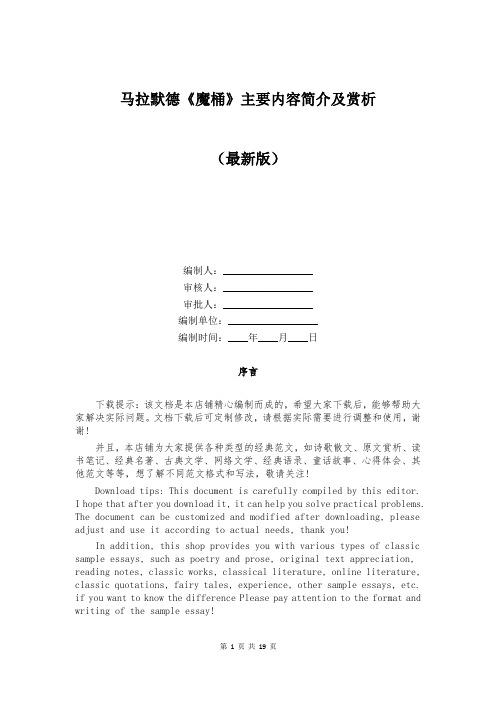
马拉默德《魔桶》主要内容简介及赏析(最新版)编制人:__________________审核人:__________________审批人:__________________编制单位:__________________编制时间:____年____月____日序言下载提示:该文档是本店铺精心编制而成的,希望大家下载后,能够帮助大家解决实际问题。
文档下载后可定制修改,请根据实际需要进行调整和使用,谢谢!并且,本店铺为大家提供各种类型的经典范文,如诗歌散文、原文赏析、读书笔记、经典名著、古典文学、网络文学、经典语录、童话故事、心得体会、其他范文等等,想了解不同范文格式和写法,敬请关注!Download tips: This document is carefully compiled by this editor.I hope that after you download it, it can help you solve practical problems. The document can be customized and modified after downloading, please adjust and use it according to actual needs, thank you!In addition, this shop provides you with various types of classic sample essays, such as poetry and prose, original text appreciation, reading notes, classic works, classical literature, online literature, classic quotations, fairy tales, experience, other sample essays, etc. if you want to know the difference Please pay attention to the format and writing of the sample essay!马拉默德《魔桶》主要内容简介及赏析【导语】:【作品提要】攻读犹太教律法的年轻人利奥芬克尔找到了萨尔兹曼来为自己做媒。
犹太性的表征受难与救赎
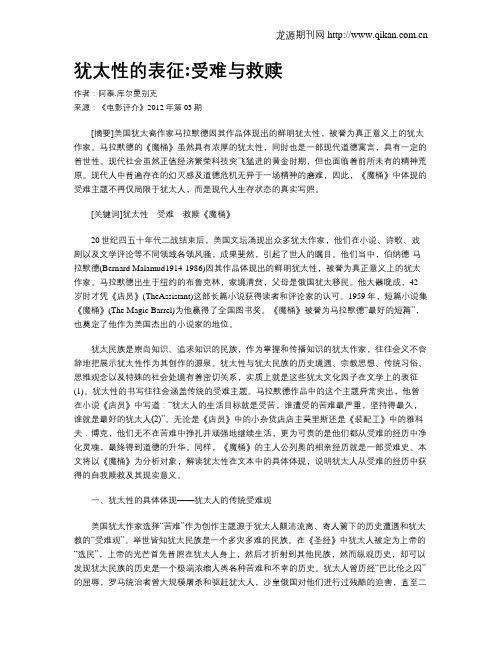
犹太性的表征:受难与救赎作者:阿泰.库尔曼别克来源:《电影评介》2012年第03期[摘要]美国犹太裔作家马拉默德因其作品体现出的鲜明犹太性,被誉为真正意义上的犹太作家。
马拉默德的《魔桶》虽然具有浓厚的犹太性,同时也是一部现代道德寓言,具有一定的普世性。
现代社会虽然正值经济繁荣科技突飞猛进的黄金时期,但也面临着前所未有的精神荒原。
现代人中普遍存在的幻灭感及道德危机无异于一场精神的磨难,因此,《魔桶》中体现的受难主题不再仅局限于犹太人,而是现代人生存状态的真实写照。
[关键词]犹太性受难救赎《魔桶》20世纪四五十年代二战结束后,美国文坛涌现出众多犹太作家,他们在小说、诗歌、戏剧以及文学评论等不同领域各领风骚,成果斐然,引起了世人的瞩目。
他们当中,伯纳德·马拉默德(Bernard Malamud1914-1986)因其作品体现出的鲜明犹太性,被誉为真正意义上的犹太作家。
马拉默德出生于纽约的布鲁克林,家境清贫,父母是俄国犹太移民。
他大器晚成,42岁时才凭《店员》(TheAssistant)这部长篇小说获得读者和评论家的认可。
1959年,短篇小说集《魔桶》(The Magic Barrel)为他赢得了全国图书奖。
《魔桶》被誉为马拉默德“最好的短篇”,也奠定了他作为美国杰出的小说家的地位。
犹太民族是崇尚知识、追求知识的民族,作为掌握和传播知识的犹太作家,往往会义不容辞地把展示犹太性作为其创作的源泉。
犹太性与犹太民族的历史境遇、宗教思想、传统习俗、思维观念以及特殊的社会处境有着密切关系,实质上就是这些犹太文化因子在文学上的表征(1)。
犹太性的书写往往会涵盖传统的受难主题。
马拉默德作品中的这个主题异常突出,他曾在小说《店员》中写道:“犹太人的生活目标就是受苦,谁遭受的苦难最严重,坚持得最久,谁就是最好的犹太人(2)”。
无论是《店员》中的小杂货店店主莫里斯还是《装配工》中的雅科夫.博克,他们无不在苦难中挣扎并顽强地继续生活,更为可贵的是他们都从受难的经历中净化灵魂,最终得到道德的升华。
魔桶读后感

魔桶读后感《魔桶》是由英国作家詹姆斯古顿创作的一部短篇小说。
这部小说讲述了一个叫蒙尼尔的母亲,因为让孩子从可怕的行为中得到庇护,而想到一种可能的解决方法魔桶。
在一次偶然的机会下,蒙尼尔带着孩子去拜访了他的朋友,把孩子放到魔桶里,让魔桶把孩子的罪行变成一张纸,从而保护孩子的身心。
在故事最后,蒙尼尔终于解决了孩子的问题,找回了孩子的温柔和快乐,同时也实现了自己的心愿。
《魔桶》这部小说让我很有感触,它用简洁优美的文字,勾勒出了生活中许多不可思议的故事,如它所说“每一桶都有一个故事”。
小说以蒙尼尔为主角,他就是那只苦苦挣扎,无法把孩子从恶习中解救出来的母亲,在极度绝望之余,竟然想到了一个不可思议的办法,将孩子的罪行变成一张纸,用这张纸保护孩子。
蒙尼尔的决心,令人动容;他所展现出来的为孩子奋斗的精神,又令人惊叹。
詹姆斯古顿把这故事放在可爱的魔桶里,又把它渲染得淋漓尽致,让读者们走进蒙尼尔的心灵深处,体会到母亲的爱和付出,感悟老师的智慧与教育的力量,深有同感。
他用神奇的故事丰富了小说的色彩,以平实的文字勾勒出真实生活中有关母爱的情感,让我们反思我们的生活。
小说最精彩的部分莫过于最后的结局,正是那只神奇的魔桶,将蒙尼尔的梦想变成了现实,让孩子从可怕的行为中得到庇护,找回了自己温柔关爱及快乐。
这是詹姆斯古顿给我们最重要的生活课题:永远记住,有时候,比起努力改变某人,更何况是那些可怕的行为,庇护他们才是真正重要的,比如把孩子放进魔桶一样。
《魔桶》是一个很有启发性的小说,它反映了当今社会中孩子们面临的这些挑战,强调了母爱及老师的智慧。
它也证明了一个事实,当所有的希望都破灭时,神奇的魔桶可以令事情发生不可思议的变化。
蒙尼尔的决心及毅力,让他最终得到了孩子的拯救,令我们真切地感受到了人性的感动。
它引导我们,在生活中遇到困难时,不应该放弃,而是要勇敢地面对,积极地创造出自己想要的结果。
从成长小说角度解读《魔桶》

从成长小说角度解读《魔桶》作者:徐楠来源:《青年文学家》2016年第12期摘要:本文从成长小说视角解读马拉默德的小说《魔桶》,在引路人莉莉和萨尔兹曼的指引下,主人公利奥逐渐完成自我救赎,经历了内心的痛苦挣扎后,明确了爱的真正意义,践行了犹太人负罪-赎罪-新生的这一生命历程。
关键词:成长小说;引路人;成长的仪式作者简介:徐楠(1990-),女,汉族,吉林长春人,硕士,研究方向为英语语言文学。
[中图分类号]:I106 [文献标识码]:A[文章编号]:1002-2139(2016)-12-0-02伯纳德·马拉默德(1914-1986)是美国当代著名的犹太小说家,在他的大部分作品中,他擅长运用怜悯而独特的幽默方式,描绘美国犹太人的生存状态,以及他们对美好生活的向往。
他的短篇小说集《魔桶》于1958年发表,这部短篇小说集一经问世便获得了巨大的成功,于1959年获得了全国图书奖。
与小说集同名的短篇小说《魔桶》中,讲述了主人公利奥芬克尔的一段成长经历。
利奥作为一名犹太教律法的大学生,为了自己光明的前途,委托媒人萨尔兹曼为其介绍对象。
媒人萨尔兹曼将利奥视作女婿的最佳人选,在他的精心安排下,利奥最终和曾经邪恶的斯特拉走到一起。
跌宕起伏的情节中,利奥完成了成长的顿悟,践行犹太人负罪-赎罪-新生的这一生命历程,在引路人的指引下,从一名困顿懵懂的少年,逐渐成长为具有成熟思想的犹太人。
成长小说(Initiation)一词最早来源于人类学,指青少年(Adolescence)经历了生活的一系列磨练和考验之后,获得了独立应对社会和生活的知识,能力和信心,从而进入人生的一个新阶段——成年。
在运用到小说领域之后,关于其内容的界定也出现了很多不同意见。
马科斯在其论文《什么是成长小说?》中指出成长小说的定义主要有两类:一类把成长描绘成年轻人对外部世界的认识过程;另一类是把成长解释成认知自我身份与价值并调整自我与社会关系的过程。
浅析马拉默德小说《魔桶》中的犹太精神
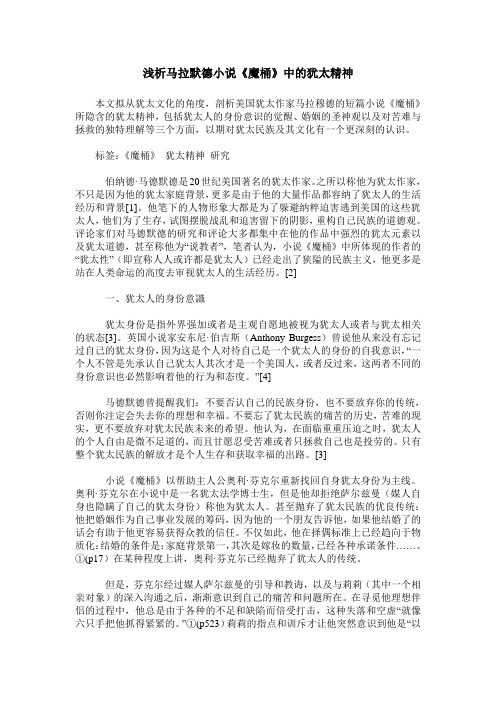
浅析马拉默德小说《魔桶》中的犹太精神本文拟从犹太文化的角度,剖析美国犹太作家马拉穆德的短篇小说《魔桶》所隐含的犹太精神,包括犹太人的身份意识的觉醒、婚姻的圣神观以及对苦难与拯救的独特理解等三个方面,以期对犹太民族及其文化有一个更深刻的认识。
标签:《魔桶》犹太精神研究伯纳德·马德默德是20世纪美国著名的犹太作家。
之所以称他为犹太作家,不只是因为他的犹太家庭背景,更多是由于他的大量作品都容纳了犹太人的生活经历和背景[1]。
他笔下的人物形象大都是为了躲避纳粹迫害逃到美国的这些犹太人,他们为了生存,试图摆脱战乱和迫害留下的阴影,重构自己民族的道德观。
评论家们对马德默德的研究和评论大多都集中在他的作品中强烈的犹太元素以及犹太道德,甚至称他为“说教者”,笔者认为,小说《魔桶》中所体现的作者的“犹太性”(即宣称人人或许都是犹太人)已经走出了狭隘的民族主义,他更多是站在人类命运的高度去审视犹太人的生活经历。
[2]一、犹太人的身份意識犹太身份是指外界强加或者是主观自愿地被视为犹太人或者与犹太相关的状态[3]。
英国小说家安东尼·伯吉斯(Anthony Burgess)曾说他从来没有忘记过自己的犹太身份,因为这是个人对待自己是一个犹太人的身份的自我意识,“一个人不管是先承认自己犹太人其次才是一个美国人,或者反过来,这两者不同的身份意识也必然影响着他的行为和态度。
”[4]马德默德曾提醒我们:不要否认自己的民族身份,也不要放弃你的传统,否则你注定会失去你的理想和幸福。
不要忘了犹太民族的痛苦的历史,苦难的现实,更不要放弃对犹太民族未来的希望。
他认为,在面临重重压迫之时,犹太人的个人自由是微不足道的,而且甘愿忍受苦难或者只拯救自己也是投劳的。
只有整个犹太民族的解放才是个人生存和获取幸福的出路。
[3]小说《魔桶》以帮助主人公奥利·芬克尔重新找回自身犹太身份为主线。
奥利·芬克尔在小说中是一名犹太法学博士生,但是他却拒绝萨尔兹曼(媒人自身也隐瞒了自己的犹太身份)称他为犹太人。
犹太性的表征:受难与救赎——短篇小说《魔桶》解析
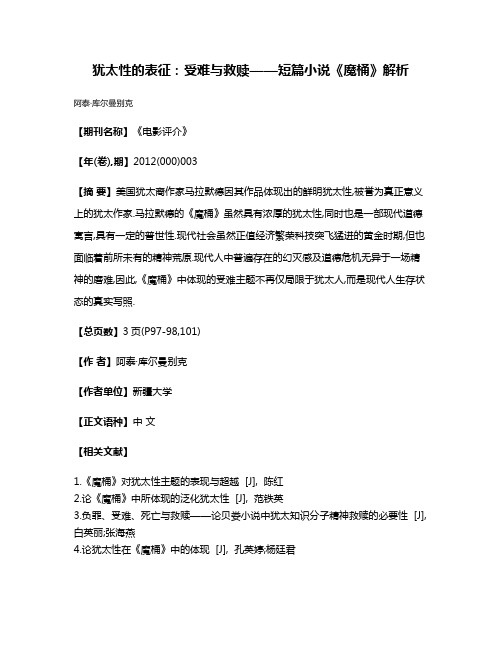
犹太性的表征:受难与救赎——短篇小说《魔桶》解析
阿泰·库尔曼别克
【期刊名称】《电影评介》
【年(卷),期】2012(000)003
【摘要】美国犹太裔作家马拉默德因其作品体现出的鲜明犹太性,被誉为真正意义上的犹太作家.马拉默德的《魔桶》虽然具有浓厚的犹太性,同时也是一部现代道德寓言,具有一定的普世性.现代社会虽然正值经济繁荣科技突飞猛进的黄金时期,但也面临着前所未有的精神荒原.现代人中普遍存在的幻灭感及道德危机无异于一场精神的磨难,因此,《魔桶》中体现的受难主题不再仅局限于犹太人,而是现代人生存状态的真实写照.
【总页数】3页(P97-98,101)
【作者】阿泰·库尔曼别克
【作者单位】新疆大学
【正文语种】中文
【相关文献】
1.《魔桶》对犹太性主题的表现与超越 [J], 陈红
2.论《魔桶》中所体现的泛化犹太性 [J], 范铁英
3.负罪、受难、死亡与救赎——论贝娄小说中犹太知识分子精神救赎的必要性 [J], 白英丽;张海燕
4.论犹太性在《魔桶》中的体现 [J], 孔英婷;杨廷君
5.二战后美国犹太文学中的"边缘人母题"及其社会功能研究——以《卢布林的魔术师》《魔桶》《勿失良辰》为例 [J], 张军;张现红
因版权原因,仅展示原文概要,查看原文内容请购买。
魔桶读后感
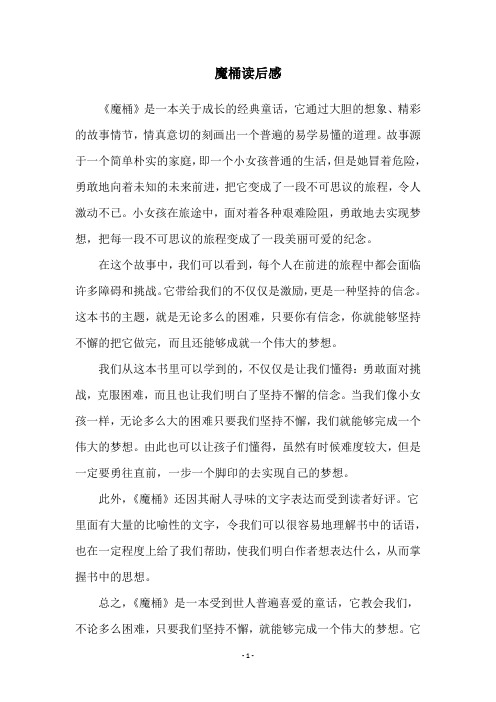
魔桶读后感
《魔桶》是一本关于成长的经典童话,它通过大胆的想象、精彩的故事情节,情真意切的刻画出一个普遍的易学易懂的道理。
故事源于一个简单朴实的家庭,即一个小女孩普通的生活,但是她冒着危险,勇敢地向着未知的未来前进,把它变成了一段不可思议的旅程,令人激动不已。
小女孩在旅途中,面对着各种艰难险阻,勇敢地去实现梦想,把每一段不可思议的旅程变成了一段美丽可爱的纪念。
在这个故事中,我们可以看到,每个人在前进的旅程中都会面临许多障碍和挑战。
它带给我们的不仅仅是激励,更是一种坚持的信念。
这本书的主题,就是无论多么的困难,只要你有信念,你就能够坚持不懈的把它做完,而且还能够成就一个伟大的梦想。
我们从这本书里可以学到的,不仅仅是让我们懂得:勇敢面对挑战,克服困难,而且也让我们明白了坚持不懈的信念。
当我们像小女孩一样,无论多么大的困难只要我们坚持不懈,我们就能够完成一个伟大的梦想。
由此也可以让孩子们懂得,虽然有时候难度较大,但是一定要勇往直前,一步一个脚印的去实现自己的梦想。
此外,《魔桶》还因其耐人寻味的文字表达而受到读者好评。
它里面有大量的比喻性的文字,令我们可以很容易地理解书中的话语,也在一定程度上给了我们帮助,使我们明白作者想表达什么,从而掌握书中的思想。
总之,《魔桶》是一本受到世人普遍喜爱的童话,它教会我们,不论多么困难,只要我们坚持不懈,就能够完成一个伟大的梦想。
它
给孩子们带来了无尽的美妙,但也给我们带来了无尽的启发,让我们也勇往直前的去追求自己的梦想。
从创伤叙事角度反观《魔桶》
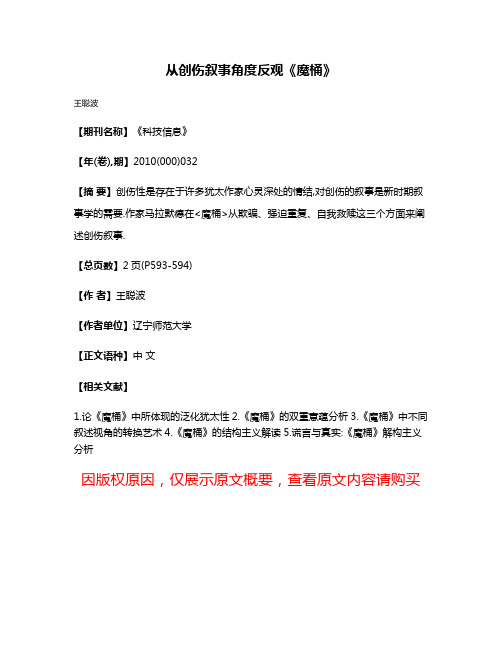
从创伤叙事角度反观《魔桶》
王聪波
【期刊名称】《科技信息》
【年(卷),期】2010(000)032
【摘要】创伤性是存在于许多犹太作家心灵深处的情结,对创伤的叙事是新时期叙事学的需要.作家马拉默德在<魔桶>从欺骗、强迫重复、自我救赎这三个方面来阐述创伤叙事.
【总页数】2页(P593-594)
【作者】王聪波
【作者单位】辽宁师范大学
【正文语种】中文
【相关文献】
1.论《魔桶》中所体现的泛化犹太性
2.《魔桶》的双重意蕴分析
3.《魔桶》中不同叙述视角的转换艺术
4.《魔桶》的结构主义解读
5.谎言与真实:《魔桶》解构主义分析
因版权原因,仅展示原文概要,查看原文内容请购买。
《魔桶》的双重意蕴分析

《魔桶》的双重意蕴分析
王文渊
【期刊名称】《无锡商业职业技术学院学报》
【年(卷),期】2015(15)5
【摘要】马拉默德的短篇小说《魔桶》不仅讲述了一个滑稽离奇的故事,同时也探讨了犹太人的重生与复苏之路,以及人类与难以捉摸的命运的抗争,指出犹太人所遵循的自我分析、皈依上帝和利他主义精神具有普遍意义.
【总页数】4页(P106-108,112)
【作者】王文渊
【作者单位】无锡商业职业技术学院国际商务学院,江苏无锡214153
【正文语种】中文
【中图分类】I106.4
【相关文献】
1.《魔桶》和《我真傻》中叙述视角的对比分析 [J], 杨娅珍
2.《魔桶》的成长主题分析 [J], 薛丽
3.论《魔桶》中所体现的泛化犹太性 [J], 范铁英
4.《魔桶》的结构主义解读 [J], 张金梅;周丹
5.谎言与真实:《魔桶》解构主义分析 [J], 刘晓庆
因版权原因,仅展示原文概要,查看原文内容请购买。
解读马拉默德短篇小说《魔桶》
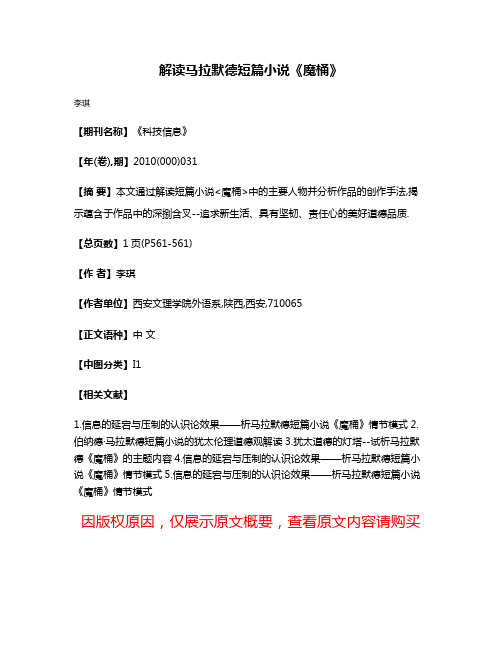
解读马拉默德短篇小说《魔桶》
李琪
【期刊名称】《科技信息》
【年(卷),期】2010(000)031
【摘要】本文通过解读短篇小说<魔桶>中的主要人物并分析作品的创作手法,揭示蕴含于作品中的深捌含叉--追求新生活、具有坚韧、责任心的美好道德品质.【总页数】1页(P561-561)
【作者】李琪
【作者单位】西安文理学院外语系,陕西,西安,710065
【正文语种】中文
【中图分类】I1
【相关文献】
1.信息的延宕与压制的认识论效果——析马拉默德短篇小说《魔桶》情节模式
2.伯纳德·马拉默德短篇小说的犹太伦理道德观解读
3.犹太道德的灯塔--试析马拉默德《魔桶》的主题内容
4.信息的延宕与压制的认识论效果——析马拉默德短篇小说《魔桶》情节模式
5.信息的延宕与压制的认识论效果——析马拉默德短篇小说《魔桶》情节模式
因版权原因,仅展示原文概要,查看原文内容请购买。
魔桶读后感

魔桶读后感
《魔桶》是一本给孩子们讲述的由趣味性和研究性构成的故事。
小说的主人公是一只名叫魔桶的独角兽,它从独角兽大王那里收到一个任务:去时光洞里拿回被人偷走的宝物。
魔桶前往时光洞时,遇到了许多困难,但它也学会了面对挫折、勇敢面对困难的精神,通过坚持不懈的努力最终完成了任务。
它也结识了可爱的伙伴,包括一只机智聪明的小鸟、一只勇敢善战的老虎、一只狡猾可爱的熊、一只贴心耐心可靠的大象以及一只充满着智慧和仁爱的独角兽大王。
到了时光洞,魔桶发现宝物被巨大的怪物所守护,怪物的身上布满了伤痕,它的本来的使命被人们草率的忘记,它想要实现的梦想也消失了。
魔桶明白了这只怪物的痛苦,它和怪物一起互相努力,最终超越了时间的阻碍,完成了任务。
在回到王国的旅途上,魔桶面对不同的挑战,但它也发现了许多有趣的事物,比如森林里的可爱小动物,大海里的船只,以及大自然可爱的风景。
在完成任务后,魔桶和它的伙伴们回到王宫时,它们收获了新的知识和成长,因为它们能够很好的理解、接受、尊重与接纳周围的环境,而不是被它们所把持。
《魔桶》不仅仅是一本小说,同时它也是一个关于感受和接受的教育。
从中,我们可以学到勇敢、坚持不懈、努力去实现梦想的重要性,同时要尊重、接受并且学会去爱自己和他人,因为只有这才能成就最美好的一切。
《魔桶》的成长主题分析

《魔桶》的成长主题分析
薛丽
【期刊名称】《齐齐哈尔大学学报(哲学社会科学版)》
【年(卷),期】2008(000)002
【摘要】成长小说的视角受到越来越多的评论者的关注,而以此来解读犹太文学作品还是一个初步的尝试.本文从成长中的顿悟、成长的引路人和成长的仪式等方面分析美国犹太裔作家马拉默德的短篇小说<魔桶>的成长主题,并以此验证了犹太人的牺牲--救赎之路.
【总页数】2页(P120-121)
【作者】薛丽
【作者单位】齐齐哈尔大学,外语学院英语系,黑龙江,齐齐哈尔,161000
【正文语种】中文
【中图分类】I106.4
【相关文献】
1.成长叙事与疗伤——《在细雨中呼喊》中的成长主题分析 [J], 程蕊
2.成长之艰辛:《阿拉比》成长主题分析 [J], 杨晶;
3.成长中的挣扎——《所罗门之歌》成长主题分析 [J], 张晓丽;赵艺
4.成长初体验——苏童"香椿树街"系列小说成长主题分析 [J], 张雅楠
5.成长之艰辛:《阿拉比》成长主题分析 [J], 杨晶
因版权原因,仅展示原文概要,查看原文内容请购买。
- 1、下载文档前请自行甄别文档内容的完整性,平台不提供额外的编辑、内容补充、找答案等附加服务。
- 2、"仅部分预览"的文档,不可在线预览部分如存在完整性等问题,可反馈申请退款(可完整预览的文档不适用该条件!)。
- 3、如文档侵犯您的权益,请联系客服反馈,我们会尽快为您处理(人工客服工作时间:9:00-18:30)。
磨难与救赎---论《魔桶》The Suffering and RedeemAbstractAmerican-Jewish writer Malamud` The Magic Barrel is his most representative short story, it depict the Jewishness and also has its universal means. The writer put the Jewish people as a representative or a symbol of human being. So, the theme of The Magic Barrel that only love can make our rebirth and end the suffering is not limited to Jewish people, but also represent the redeem that the modern people want.Key words: The Magic Barrel Jewishness Love Suffering Redeem摘要美国犹太裔作家马拉默德的《魔桶》是他最具有代表性的短篇小说,既描写了犹太性,也具有一定的普世性。
作者把犹太人作为人类的代表或象征, 表现了人类普遍性。
因此,《魔桶》中体现的在唯有爱使我们重生,不在受难的主题不再仅局限于犹太人,也代表了现代人希望得到的救赎。
关键词:《魔桶》犹太性爱受难救赎IntroductionBernard Malamud (1914-1986), was an American author of novels and short stories. Along with Saul Bellow and Philip Roth, he was one of the best known American Jewish authors of the 20th century.a famous Jewish writer, who was born in Brooklyn in New York. His parents were Russian Jewish immigrants, struggling hard to maintain life in the Unites States. Malamud entered adolescence at the start of theGreat Depression. From 1928 to 1932, Bernard attended Erasmus Hall High School in Brooklyn. During his youth, he saw many films and enjoyed relating their plots to his school friends. He was especially fond of Charlie Chaplin's comedies. Malamud worked for a year at $4.50 a day as a teacher-in-training, before attending college on a government loan. He was excused from military service in World War II because he was the sole support of his widowed mother. Although his childhood was spent in poverty, he had a strong love for books, writing and story-telling. In 1936 he got bachelor degree in New York City University after 4 years' study there; and in 1942 he received his M. A. from Colombia University. Since then Malamud started his teaching life in evening high school, college and other educational institutes for a few years and then became an instructor in the English Department at Organ State University. Meanwhile,he started his writing.In comparison with some other Jewish literary pioneers such as Saul Bellow and Phillip Roth, Bernard Malamud's literary fame came relatively late. Malamud wrote slowly and carefully; His first novel, the Natural, came out in 195Leo, it received little recognition, perhaps because of its obscure mysticism. But in 1958, his second novel The Assistant, was an immediate success and is generally concerned as Malamud`s masterpiece. His collection of short stories The Magic Barrel, won the National Award for Fiction and established him as a famous writer. Malamud is a diligent and prolific writer, in his whole creative life, he wrote eight novels, four collections of short stories and a number of uncollected stories as well as an unfinished fiction when he died in 1986. His works are well-accepted and won him numerous awards and earned a reputation as an acknowledged fiction writer, with his work impressive both in quantity and in quality.Malamud is signified as a Jewish writer, not only because his Jewish identity, but also because in his works. He focused on the low-status Jewish people and presents a typical Judaismclaim of "to achieve moral transcendence through suffering".His works have a sense of Jewishness, them talk about how Jewish people struggle their lives in America, enduring their physical or spiritual suffering, how they try to keep their religious believes in a hostile land and search for their own identity. Malamud is keenly aware of ages of Jewish suffering, Poverty, indebtedness, homelessness and solitude are common pressures on many of his Jewish characters. He often uses a prison motif to evoke any place or circumstance which restricts man`s freedom of development. Malamud is a Jewish writer characterized by his Jewishness and his heartfelt concern for their Jewish fate.Malamud cares much for the future of the Jewish people, as well as the continuance and development of the Jewish tradition and spirit.Around the theme of suffering, Malamud puts forward his belief that the Jewish spirit will continue and develop rather than extinguish for its strength can influence others and transform others, in the process of which the Jewish spirit is not only inherited but also sublimated. As a Jewish writer, it was quite right for Malamud to describe the Jews. So what did the Jews mean? From his point of view, the so-called Jews meant suffering and seeking the relief from destiny in suffering. And in his short story The Magic Barrel, that`s love give both Leo and Stella rebirth.But Malamud denied his tendency towards Jewish writing. His work is about the Jew, but not only the Jew, but everyone. He would like to pursue a universal value by surveying and examining the Jews in the development of human culture. The history of Jewish people is a concentrate of human history and the common destiny. The is why the Jewish writers tried hard to get rid of the narrow and limited part of Jewishness, and put the Jewish people as a example or a symbol of all human kind. When the Jewish writers represent the suffering and self-confusing of Jewish people, they actually is describe the life situation of everyone.The suffering and redeemThe Magic Barrel, which is taken from the short story collection of the same title, is considered to be as Malamud`s “super story”. There are two main characters in this story, Leo Frinkle and Pinye Salzman. Leo is a student in the Yeshivah University who is going to be a rabbi. In order to help his career, Leo decided to get married. But due to his six-year devoted into studies, he is alone is this world, no social life and on company of young women. So he called in Salzman, the marriage broker for help. Unhappy and total disappointed about a blind date with one of theproposed women, Lily, he retreats questioned his life and relationship with God. The marriage counselor suddenly turns up delivering him photographs of women, which he initially ignores. However, some day later, he discovers another one in the envelope. He instantly falls in love with that picture and eager to meet her. After he's found the marriage counselor, (who left him immediately after delivering the photographs)he found out that the girl is the counselor's daughter ,who is evil and not goog for a rabbi. After the deep thought, Leo decided to meet her anyway; the Salzman hiding around the corner, "chanting prayers for the dead”.The story mainly concerned a rabbi's growth in spirit and in mind.In this story, the analysis and exploration of the Jews on the spiritual level was extremely profound; the depiction and portrayal of the characters was particularly vivid. It was holy for spiritual growth and leap, but the loneliness and suffering through its process was unbearable for ordinary persons. Having experienced pains and failures in the course of blind date, the hero Leo managed to root out his what he really want, his destiny and redeem. In spite of all manner of difficulties in mind and in moral, he still insist his love and finally met Stella. By redeeming the lost girl, he attained a self-redemption and came to spiritual rebirth in the end.The suffering theme is an crucial part of the Jewish historical and cultural connotation in Malamud`s works . It plays a vital role in Malamud's writing. The suffering theme represents a close relationship among Jewish theology, history and literary. Probably because for the Jews, who consider themselves as the God`s “chosen people”, they are suffering for a better life, and besides,the sufferings means not only enduring the miseries, but also carrying their own responsibility and hope. In the Malamud's stories, "suffering" is a necessary step for people to realize moral growth and get redeem.at the beginning of this novel, Leo had been advised by an acquaintance that he should get married to make it easier to win himself a congregation. And later in the story, Leo told Salzmant that except his parents who had married comparatively later in life, he was alone in the world. What`s more, because he had devoted himself into studies for six years, he has no time for a social life and the company of young women. From these description, it is not hard to find that Leo is suffering of loneliness. He has no friends, the advise was given by an acquaintance. No family member to care about, his parents have new family and left him alone on this world. No social life, because he has no time and no lover, because he already forget how to love someone. He had beenlonely for such a long time he did not even know that he is lonely. He isolated himself in a small world which is made up with books, shelves of books. He did not look out of the window, only after the appear of Salzman, and for cover his shyness, he looked out of the window and noticed the it was still February, winter was on its last leg for the first time in years.In The Magic Barrel, after several meeting with Salzman,Leo finally decide to meet one of the girls---Lily, who is older than him. At the date, when Lily asked Leo, did he become enamored of God, he could`t answer it. And after a long pause, he only answered that he is not enamored of God, and he come to God not because he love Him, but because he did not. This blind date is nothing but a disappointment. what`s worse, the talk with Lily threw him into deep thinking about himself, his religion, and his true relationship with God. For the first time, he saw himself clearly.Her (Lily's) probing questions had somehow irritated him into revealing---to himself more than her---the true nature of his relationship to God, andfrom that it had come upon him, with shocking force, that apart from his parents, he hadnever loved anyone. Or it perhaps it went the other way, that he did not love God so wellas he might, because he had loved man.This bitter revelation brought Leo into a point of panic. And his life turned to be the worst, he could`t eat and study, and he was seriously thinking of leaving the Yeshiva, because God said, love me, love my people, but he did`t love God, and he did`t love anyone. This was no reason for him to continue study the Law. He suffered the pain of doubts, he doubted his love to God, to mankind, to his religion and career. After a painful straggle, he come to the conclusion that "he was a Jew and that a Jew suffered." Because they are the chosen people by God, they must endure these sufferings for themselves, for the mankind. Only by enduring the suffering of deep thinking, overcome all his doubts, can Leo realize his true nature and purpose of life.It was the beginning for his sin destiny, and a preparation for his later journey of rebirth.Then, here comes the climax of the stroy . Just when Leo was so disappointed and anger about Salzman, and he decided to seek his wife in a different way, he found the packet of Salzman, and saw the picture of Stella. At the first sight of the snapshot, he was deeply moved by the face. He fell in love with her youth, like a flower in spring, and her suffering eyes, wasted. As his eyes rested on it for a while,a sudden vivid likeness passed before him. He hurried to find Salzman for his matchmaking. Unexpectedly, Salzman turned pale with a big scare and refused to tell him the girl`s name. He told Leo there was a mistake about this photo. It was not for him. The girl in the photo is Salzman's daughter who he thought was not qualified to marry with Leo, a soon to be rabbi and she should burn in hell. But Leo is already fell in love with Stella even she is a wild one. Lying on the bed, he thought his life through. Though he prayed to get rid of her, he was scared he did not love her any more. The struggle in his spirit tortured him endlessly. And through those torments, he gained the wisdom which can not get from book, but life. In this suffering, "He then concluded to convert her (Stella) to goodness, himself to god." Till now, Leo finished his rebirth ultimately. He finally find his redeem and realize how what he want in life. He made up his mind, and told Salzman: “love has at last come to my heart.” he got out of his isolated small world, pursuing love and serving people.Wanting to be loved, one must love others at first. can really love God. conclusionFrom the story, we learned that Leo was a poor student who is going to be a rabbi and enjoy a good life. But in order to do that, Leo has get married. His search for wife made him rethink his life and finally realize what he really want and what`s his life aim at. He voluntarily went onto a track of the Jewish destiny to endure suffering, and to redeem others. From serving for God because of the desire to have a better life, finding a wife just for have a better career, to bravely choose a guilty woman as his wife and convert her to goodness, himself to God, he ended his suffering and got a spiritual rebirth in this way. At the end of the story, the man who planed all this, Salzman, stand around the corner, leaning against a wall, chanted prayers for the dead." The dead meant the death of Leo`s suffering and Stella unclean past.In Malamud`s works, he tried to associating the Jewish cultural traditions with modern social background, Malamud has established a close relationship between Jewishness and universality by allegorical portrayal of the Jews and the Gentile. The spiritual waste land is grow fast in the modern society, everyone is isolated and lonely, everyone is suffered, just like Jew, as Malamud said, "All men are the Jews." In this sense, the Jewish characters he has depicted are as well as the common people. In this way, the Jewish people become a symbol of all human beings. And the only thing to end this isolation and suffering, is love. Love people and to be loved, is theonly way to redeem.BibliographyMalamud, Bernard, The Magic Barrel, New York: Farrar, Straus&Giroux 1980Astro, Richard and Jackson J., Benson, eds. The Fiction of Bernard Malamud. Corvallis: Oregon State University Press, 1977.李鑫华:“论前景化在《魔桶》中的表现意义”,《国外文学》(季刊),2001年,第3期。
